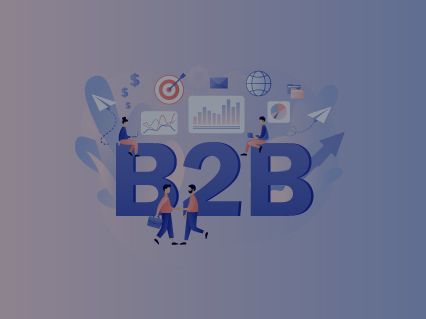B2B marketing and sales have traditionally relied on a more straightforward approach, with businesses reaching out to potential customers via cold calls, emails, and direct mail. However, Martech is changing the game by enabling businesses to reach potential customers more effectively and efficiently.
Martech, a combination of marketing and technology tools, is essential for B2B businesses to improve their marketing efforts. It involves using software and platforms for data analytics, customer relationship management ( CRM integration ), social media management, email marketing, and more. By utilizing these tools, B2B businesses can better understand their customer’s behaviour, preferences, and needs and provide personalized and engaging experiences across various channels. Confusing? Worry not! This blog will discuss B2B integration, how it works, and the required funnel-wise approach for success.
What is B2B integration?
B2B integration refers to using technology to connect businesses with their partners, suppliers, and customers to facilitate seamless communication and data exchange. This type of integration is critical for streamlining business processes, increasing efficiency, and improving customer experiences.
Leveraging B2B integration as Martech is transforming B2B marketing and sales by providing B2B businesses with a range of capabilities that enable them to deliver more personalized and engaging customer experiences.
How Martech is Transforming B2B Marketing and Sales
Martech is transforming B2B digital marketing and sales by enabling businesses to create more personalized and targeted campaigns, streamline workflows, and gain insights into customer behaviour. By leveraging these tools, businesses can improve their customer engagement and drive revenue growth. Let’s look at some of the effective strategies that leverage MarTech in transforming B2B Marketing and Sales:
Account-Based Marketing
Account-based marketing (ABM) is a B2B marketing strategy that targets specific accounts or companies with personalized marketing campaigns. With Martech solutions and tools such as CRM software, businesses can gain insights into their customer’s needs and preferences, enabling them to create more personalized and targeted ABM campaigns.
Example: An enterprise software company can use Martech tools to identify potential customers in specific industries and create personalized campaigns that speak to their pain points.
Sales Enablement
Martech tools are also transforming B2B sales by enabling sales teams to be more productive and efficient. Sales enablement platforms help sales teams streamline workflows, automate repetitive tasks, and gain insights into customer behaviour.
Example: A B2B SaaS company sales team can use a sales enablement platform to automate the creation of sales proposals and track their progress, enabling them to close deals more quickly and efficiently.
Personalization
Martech solutions and tools also make it easier for B2B businesses to create personalized customer experiences. By leveraging data analytics and AI, businesses can gain insights into customer behaviour and preferences, enabling them to make more targeted and personalized marketing campaigns.
Example: A B2B marketing agency can use data analytics and AI to identify potential customers’ needs and preferences and create personalized campaigns that speak to their pain points. Let’s explore funnel strategies to help you ace business technology Integration for B2B.
Funnel-wise Approach
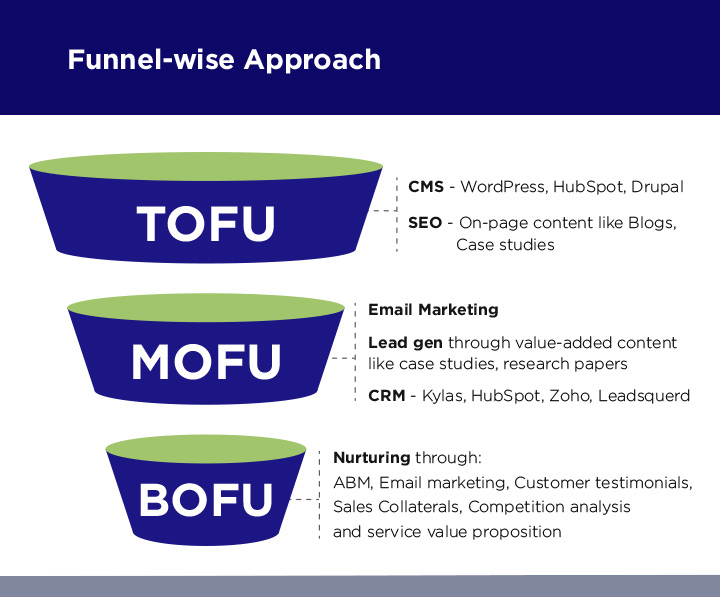
1.TOFU
The key to TOFU’s success is building brand awareness and establishing your brand as a trusted authority in the tech integration space. By creating valuable content, engaging with your audience on social media, using targeted advertising, and hosting events, you can attract new leads and start them on the path toward becoming customers.
-
Content Management System (CMS)
Choose a CMS platform like WordPress, HubSpot, or Drupal to create and manage your website content. Ensure your website is easy to navigate and mobile-friendly to provide a good user experience. Use templates and plugins to streamline your content creation process and make it easier to maintain your site over time.
-
Search Engine Optimization (SEO)
Optimize your website’s on-page content, such as blog posts and case studies, with relevant keywords and phrases to improve its search engine ranking. Use meta descriptions and title tags to provide a clear and concise summary of each page’s content. Incorporate internal and external links to other relevant content to provide additional value to your audience and improve your website’s credibility.
-
Social Media Marketing
Use social media platforms like LinkedIn, Twitter, and Facebook to promote your brand and drive traffic to your website. Share your blog posts and case studies on social media to reach a wider audience. Engage with your followers by responding to comments, answering questions, and sharing relevant industry news and insights.
-
Webinars and Events
Host webinars or events that provide value to your audience and showcase your expertise in technology integration in the business space. Use social media and email marketing to promote your webinars or events and drive registrations. Use these opportunities to capture leads’ contact information and follow up with them after the event.
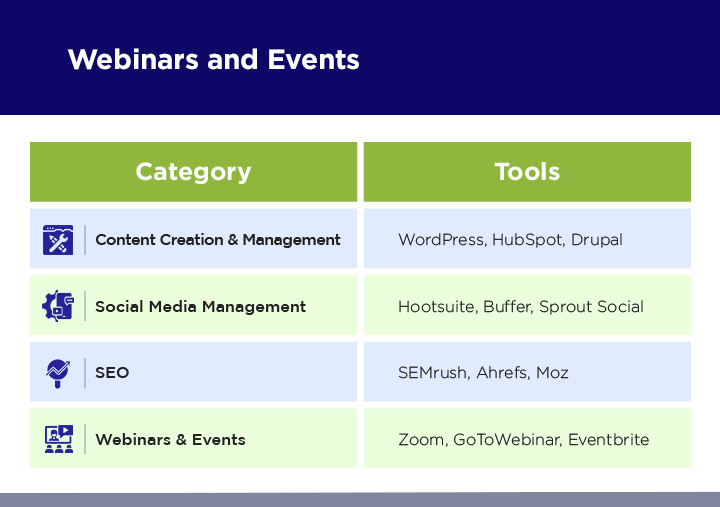
2.MOFU
The key to success in MOFU is to provide value to your leads at every stage of the funnel. Personalizing your messaging, offering valuable content, and using a CRM to manage your leads can build trust and establish your brand as a go-to solution for B2B integration.
-
Email Marketing
Personalize your emails with relevant information based on the lead’s interests and needs. Use engaging subject lines to grab the lead’s attention and entice them to open the email. In your emails, provide valuable information or insights, such as industry trends or tips on solving common pain points. Include a clear call-to-action in each email that directs the lead to the next step in the funnel.
-
Lead gen – Value-added content
Create case studies that showcase the benefits and ROI of your B2B integration solutions. Develop research papers that delve into the industry’s challenges and how your solutions address them. Share these materials through various channels, such as email campaigns, social media, and your website. Provide gated access to your content to capture leads’ contact information and track their engagement.
-
CRM Integration
Use a CRM tool like Kylas, HubSpot, Zoho, or Leadsquared to manage and track leads through the funnel. Segment your leads based on their interests and behaviour to provide targeted messaging and offers. Set up workflows to automate follow-up tasks and ensure no leads slip through the cracks. Use analytics and reporting tools to monitor performance and optimize your strategies.
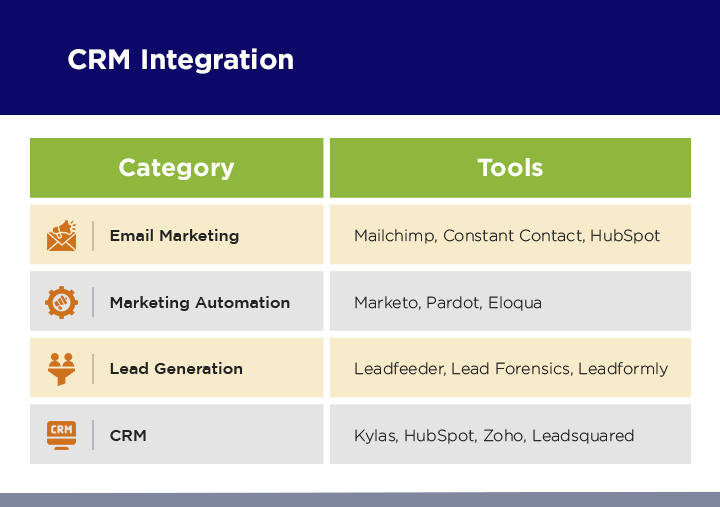
3.BOFU
The key to success in BOFU is to provide leads with personalized, valuable content that builds trust and positions your brand as the best B2B solution for their needs. You can nurture leads and convert them into loyal customers using ABM, email marketing, customer testimonials, sales collaterals, and a strong value proposition.
-
Account-Based Marketing (ABM)
Identify high-value accounts that fit your B2B integration services well. Create personalized marketing campaigns for each account, using targeted messaging and content that speaks directly to their pain points and challenges. Use account-based advertising to reach decision-makers at each account and drive engagement with your brand.
-
Email Marketing
Use email marketing to nurture engaged leads with your brand, providing valuable content and building their trust. Segment your email list based on factors like lead source, engagement level, and industry vertical to ensure your messaging is tailored to each audience. Use targeted CTAs in your emails to drive leads further down the funnel and encourage them to take action.
-
Customer Testimonials
Collect customer testimonials that showcase your success in delivering tech integration services for other B2B companies. Use these testimonials on your website, social media, and other marketing channels to build trust and credibility with potential customers. Consider creating case studies that highlight specific success stories and showcase the impact of your services on real-world business challenges.
-
Sales Collaterals
Create high-quality sales collaterals that provide valuable information about your tech integration services and how they can benefit B2B companies. Use these collaterals in your sales process to educate potential customers and overcome objections. Consider creating interactive demos or other visual aids, allowing potential customers to see your services and better understand their work.
-
Competition Analysis and Service Value Proposition
Conduct a thorough analysis of your competition and identify what sets your tech integration services apart from others in the market. Develop a strong value proposition that highlights the unique benefits of your services and positions them as the best solution for B2B companies needing tech integration. Use your value proposition in your marketing and sales messaging to differentiate your brand and stand out from the competition.
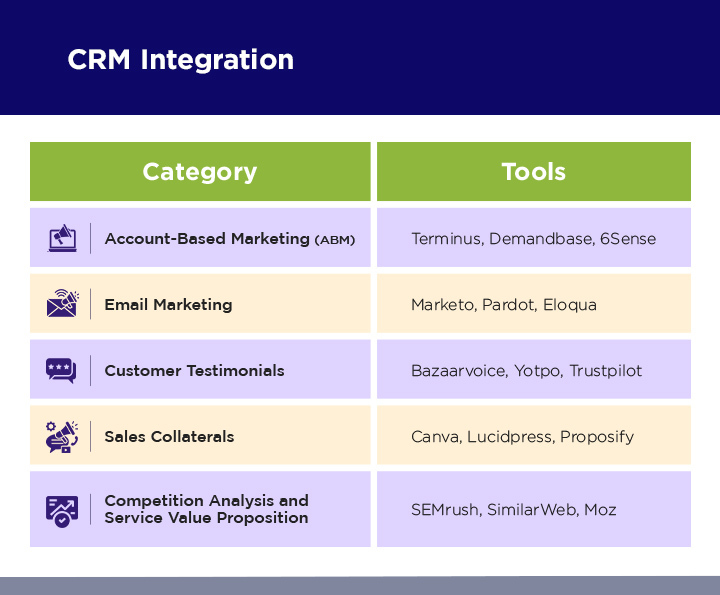
Analytics and Reporting
Analytics and reporting are essential components of any successful marketing campaign. They provide valuable insights into your campaigns’ performance and where you can make improvements to drive better results. Here are a few ways in which analytics and reporting can help optimize campaigns and define the content strategy:
Optimizing Campaigns
Analytics and reporting can help you identify which campaigns are performing well and which are underperforming. By tracking metrics like click-through rates, conversion rates, and cost per conversion, you can determine which campaigns drive the most value for your business. With this information, you can optimize your campaigns by reallocating the budget to the best-performing channels, adjusting ad targeting, or testing new messaging and creativity.
Defining Content Strategy
Analytics and reporting can help you understand which content types resonate with your audience. By tracking metrics like time on page, bounce rate, and social engagement, you can determine which pieces of content are most engaging and effective at driving traffic and conversions. With this information, you can refine your content strategy by creating more content types performing well and adjusting your messaging and format for underperforming content.
Leveraging the Google Ecosystem
In addition to providing valuable insights into campaign performance and content strategy, analytics and reporting enable businesses to leverage the Google ecosystem to improve their marketing efforts. For example, Google AdSense can display targeted ads to potential customers, while Google Analytics can help businesses track website traffic and user behaviour. Finally, Google Data Studio can create custom reports and dashboards that provide a real-time view of campaign performance.
Bottom Line
Martech is transforming B2B customer engagement by integrating CMS, SEO, email marketing, CRM, and analytics technologies. If you’re looking for a Martech-savvy agency, Amura, a performance marketing agency , is an excellent choice for maximizing the impact of your marketing efforts. Amura Marketing Technologies is one of India’s best growth marketing agencies, offering a full-funnel service that includes funnel visibility and end-to-end lead-to-onboarding closure journeys. With Amura’s help, businesses can leverage the power of Martech to optimize campaigns, generate leads, increase customer loyalty, and drive revenue growth.


